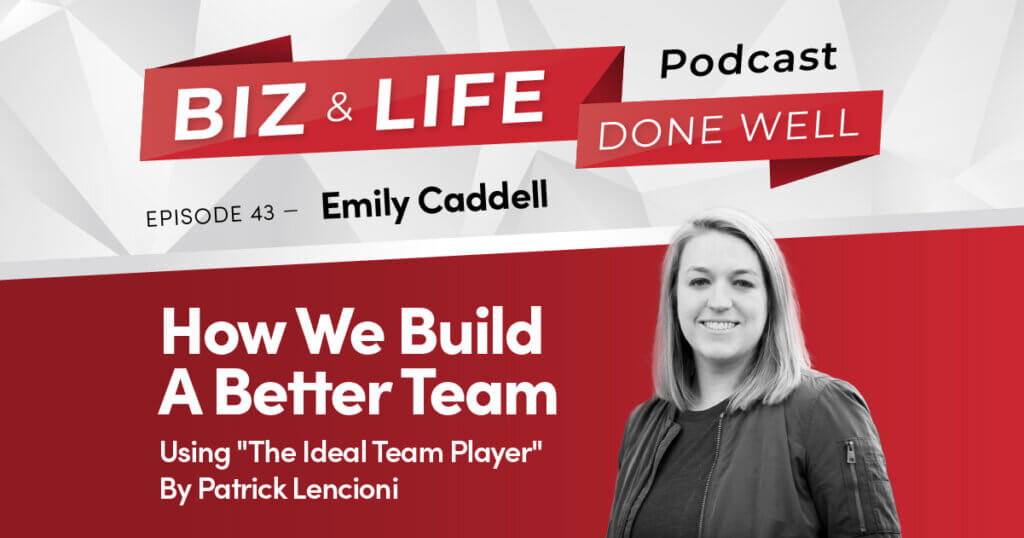Title: How We Use “The Ideal Team Player” By Patrick Lencioni To Build A Better Team
Guest: Emily Caddell
Peter: This is about the ideal team player, but really, it’s about building the ideal team and winning. Absolutely. Welcome to the Biz and Life Done Well podcast, where we explore what it means and what it takes to do business and life well. I’m your host, Peter Wilson. If you’re like me, you’re intrigued by stories common people who have achieved uncommon success in business and life.
Join me as I interview fascinating people about how they got started, their successes and failures, their habits and routines, and what inspires them. In this episode, I’m joined by Emily Cudell. She is the director of marketing for bizmarketing.com. We’re going to discuss the ideal team player, how we’ve used Patrick Lencioni’s book, The Ideal Team Player to cultivate three essential virtues at our company. Let’s dive right into it.
So there’s this book that Patrick Lencioni wrote. He’s also the bestselling author. I’ll just mention of another book called The five Dysfunctions of a Team. This is sort of the positive side, I think, of team building the ideal team player. First question I have for you is what is an ideal team player and where does this come from?
Emily: Yeah. So Patrick Aluncioni came out with a book called The Ideal Team Player, and he basically outlines that at work and, I mean, really just in life in general, you need to have three essential virtues, which are hungry, humble, and smart. Here’s a few questions to basically outline what each of these mean. They might be a little different than you’re expecting. So humble is questions like, does he genuinely compliment or praise teammates without hesitation?
Does she easily admit when she makes a mistake? Does she gladly share credit for team accomplishments? Does he readily acknowledges his weaknesses? So those are all being humble, the virtue of being humble. So the next one is hungry.
Does she have a passion for the mission of the team? Does she feel a sense of personal responsibility for the overall success of the team? Is he willing to eagerly take on tedious and challenging tasks whenever necessary? And the third is smart. And this is more related to emotional intelligence kind of smart and relating to other people.
So questions like, does he seem to know what teammates are feeling during meetings and interactions? Does she show empathy to others on the team? Is he aware of how his words and actions impact others on the team?
Peter: Powerful stuff. In the book, we learned that it’s really important to possess all three of these. He calls them virtues, but they play out as behaviors. What you’re talking about here really are behaviors and especially as they relate to interacting with teammates and potentially with customers as well. So question I have for you is why is it important for us at our company that our team exhibits these qualities?
Emily: Biz marketing, we’re a smaller team, most of us are virtual. So we really need to work well together to succeed. If we are exhibiting these qualities, then we’ll get more work done, work more more cohesively. Our systems really work well because we all work on being hungry, humble, and smart. And if we are not working on these virtues, then, honestly, we’re not as successful as we could be.
So that’s why it’s really important for us that we are all all teammates are exhibiting these virtues.
Peter: So how do you see Hungry, Humble and Smart play out in our day to day work and team interactions here?
Emily: Sure. So everyone at Biz Marketing has their strengths when it comes to our work. We all have our different domains in our jobs, but we all really acknowledge that each of us have our strengths, and we trust each other to get the job done. On top of that, we also need to have the trust with each other of, you know, am I being acknowledged in my work? Am I admitting to my faults?
Am I also receiving these virtues from each other? So we have a weekly team meeting where a lot of these qualities are on display, and I can talk about each of those qualities and how we have them in our meeting.
Peter: So Emily, why don’t you tell me how you see each of these, well, virtues or sets of behaviors? We actually play them out interactions here at the team. Let’s kick off with humble.
Emily: Every week, we have a time where we can do a team shout out so you can give someone else in the team credit for something that they’ve done that was especially helpful for you to get your job done as well. Or, hey. You really came in clutch at this moment that I needed you to do this thing, and you didn’t even need to do it right now. I needed to do it, and you did it anyways. Or just like, thanks for getting that done.
That was a huge deal, and I wouldn’t have gotten it done without you. So it’s a great way to really show each other that we see each other and we see each other what each other is doing. And another way that I think our we work on being humble is that we talk about a customer success story. So we kinda show praise that other, that our clients have given to us. And usually, that also goes around with a team shout out.
It’s like, hey. This person really loved what we did, but I wouldn’t have gotten it done without this other person. So it’s really a good way for us to collaborate and come together and show that our work matters.
Peter: Yeah, I really like the customer success story aspect of our weekly team meeting because I know for a fact, because we’re 90% virtual, not 100% virtual, but we’re all heads down working on our particular area of expertise each week. Some of us have more interactions with our clients than others. It’s important that somebody may do something, for example, our project manager, Anne might be working on something she may not interact with a client. The client’s super happy about the results of the work, or maybe it’s our web developer, Tim, who’s working on something. Again, he may not talk to the client.
The client is super pumped about the success they had. So it’s great to make sure that those people hear that feedback in kind of this shared environment. For example, if I was talking to the client, which I’ll do often, and just kept that praise to myself, right? It just wouldn’t be fair. And so it’s really great to be able to share that in that open environment with folks who may not even know that the client was really happy about something.
Emily: Absolutely. Yeah.
Peter: So, let’s move on to hungry. So, what what sorts of things do you see as it relates, like in our weekly meetings, where we cover sort of this, where we exhibit this virtue with these different behaviors that are signifying that we’re hungry?
Emily: Yeah. So once a month we review our KPIs, which are key performance indicators, and we’re always looking for ways to improve. So that’s really why we’re looking at that, just to see where we’re at, how the month went and what we can do better. So I think that really feeds into the hungry just because we’re always looking to do better and improve. This is also a time where we can discuss work that needs to be collaborated on, and we look for opportunities to really improve ourselves and improve our work with our clients.
Because this is really the one time that we all get together, one point, so we can all really work to for one common goal.
Peter: And
Emily: And then once a month, we do an extended education moment where we discuss a book, like the ideal team player. We watch a video or we read an article that we can use to grow. Usually, it’s work based. Sometimes it’s personal. We’ve done a lot of like personality tests and stuff like that.
And it’s really just to help us grow in ourselves and grow together as biz marketing.
Peter: Well, I think having that always learning approach, I don’t think there’s anybody on the team that says I know it all. There’s always things that I can learn and it’s just kind of our core value. It’s not one of our stated core values, but it’s like lifelong learning is really important. I think that really shows that we are hungry for sure. And that we’re also humble, like we don’t know it all.
Emily: Absolutely.
Peter: And then finally, smart. How do we relate to this in our weekly meetings?
Emily: Right. So, yeah, like you said, we’re about 90% virtual. So we’re not all getting that face to face with each other that we could be getting if we were in the office together. So it’s really important that we get to know each other well, and we have limited time to do that. So we start off our meetings by sharing a high from our week.
So it could be anything as simple as had a great weekend with my family or this really great thing happened, whatever it is, just something really positive. And it kinda gets us off on a good positive note, but it also just helps us know each other better of, like, I didn’t know that Kyle was really into dirt biking, and he shares that as his high most of the time. So that’s great. Or I share about my son and what we did this weekend. So it’s really been a good way to empathize with each other to just improve our relationships with each other.
And then another way is just that we’re really always encouraging each other. There’s really no negative vibes during our meetings. We would never say anything bad about someone. So we’re really just a positive. I I always feel good leaving our meetings because we all do really like each other.
We all get along really well. And so and I do feel like my teammates have my back. They exhibit all of the smart, empathetic, emotional intelligence that we are looking for.
Peter: There are two things I want to mention here. One is our high from the week, it’s actually high tide, which correlates to the office that we have here in Edmonds, which is, I can see the tide here. Right now it looks like the tide is up. Yeah, it’s a high tide right now. Sort of a play on that.
And also, again, great team vibe our stated is one core values as well. So And the last thing I want to mention is that we’ve had to work on this. I mean, I’m really happy where we are as a team right now, but we’ve had our challenges as a team.
Emily: Yeah. Like any team, you’re going to We have very different personalities on our team, but I do think we’ve figured out a way to work well with each other’s personalities. And like you said, it was a growth point for sure. We’ve worked hard at it, and it’s been worth it. And I think this book has also helped us figure that stuff out a
Peter: little bit. Right. I mean, one of the things I liked about the book, there’s like self assessment in there. And that’s one of the exercises is a self assessment. Then you share with the team kind of, you know, your score in the different areas, and we’re all different, right?
So I think that was very interesting, because we were able to see for ourselves where we might be lacking or might have room for improvement, and share that as a team, and in some respects, kind of make light of it.
Emily: Yeah,
Peter: I know a lot of business owners and managers listen to the podcast. What I’d like to know is what are your final takeaways for businesses looking to implement the ideal team player? Some of the principles, I guess, in the ideal team player.
Emily: Yeah. So, I mean, obviously, we really love this book. So I would encourage you to get the book for your team, especially your higher up and have them read it, do it, maybe a team book club with the book. It’s a really easy read. It starts off with a story, and then it goes into more of the principles of each of the virtues.
So it’s really easy to read, but it’s a really great thing for you to do as a team together. I wouldn’t just have your CEO or president read it. I would have the team read it together. And then after everyone’s read it, I think you should have every team member fill out the self assessment. If you do feel like you need a manager assessment, there’s also that in there as well if you see that as a growing point for your team.
And then the third thing I would do is assess your business, see where you’re lacking in these areas. And I do think he gives you some good clarity on what you can do if you’re lacking in some of these areas. And what’s important for you to do. So again, highly recommend.
Peter: Yeah, there’s some he gives some suggestions about folks that may be trainable, maybe some strategies for that. And if you do the self assessment, make sure that the team sits down in an appropriate environment, reviews the self assessment. Again, in an appropriate environment, you don’t just want to tell everybody, Okay, read this book tomorrow. The next day, we’re going to have this meeting.
Emily: Right. You
Peter: should, at the very least, have some familiarity with it. Maybe listen to a couple of Patrick Lencioni’s podcasts that are readily available. I really appreciate your time today, Emily. This is a great tool to help build that ideal team. This is about the ideal team player, but really it’s about building the ideal team and winning.
Thanks for listening to this episode of Biz and Life Done Well with Peter Wilson. You can subscribe to us on iTunes, Google Podcasts, Spotify, and most of the other popular podcast platforms. Please tell your friends about us and leave us a review so even more people will find out about us. Thanks again. We’ll see you soon.



